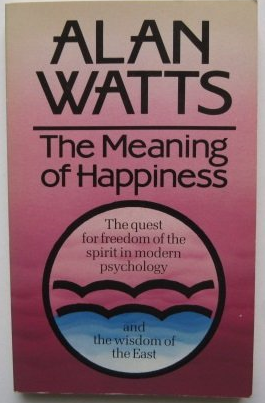In 1940, as the Second World War began its violence, a 25-year old Alan Watts published a book called The Meaning of Happiness. Its subtitle was the quest for freedom of the spirit in modern psychology and the wisdom of the East.
 This book shares the same essential message of countless books, articles and lectures that followed: you are not only what is inside your “bag of skin”, you are what is outside of it too. To kick off the new year, let me explain what this means and how it relates to happiness…
This book shares the same essential message of countless books, articles and lectures that followed: you are not only what is inside your “bag of skin”, you are what is outside of it too. To kick off the new year, let me explain what this means and how it relates to happiness…
Watts ([1940] 1968: ix) points out that generally there are two types of books on happiness:
- ‘those which tell us how to become happy by changing our circumstances’
- ‘those which tell us how to become happy by changing ourselves’ (emphasis mine).
Yet he points out that his book does neither. Instead, his book points out that ‘it is possible in a certain sense to become happy without doing anything about it’ (ix).
The Meaning of Happiness offers a means of becoming happy without changing anything. He leads readers through a process of acceptance of self—where you are and as you are. If you cannot be happy in this moment, then you will never be happy, because life is a series of moments.
In an age that tells us happiness will come if we try harder, if we do more, if we get better grades, if we buy that dress, car, or house, score that chick or marry that man, get that job, have that much money, then and only then we will be happy. In such a culture, is it really possible to accept our selves and be happy now?
Watts says yes we can. None of these external things will actually bring us happiness.
Watts points out that happiness of the deepest kind is found through ‘a conscious harmony with life and nature both in external circumstances and in oneself’ (xvii).
This is not so say we should become lazy and do nothing. Watts points out that even thought ‘happiness is associated with relaxation,’ it is possible to be happy whilst being challenged or ‘in the midst of strenuous effort’ (xxi). Paradoxically, Watts goes on to point out that happiness, like relaxation, is not something we can try to achieve. Neither are obtained by effort.
The more you try to relax, the more stressed you are likely to feel. Instead we have to let go of the effort, stop trying!
Stop. Look.
Look at yourself—what lies inside your skin and what lies outside it—and observe your intimate connections, the relationships, the processes.
See that You are always in process with everything else. Let go. Relax into the harmony of the process.
Watts goes on to say that the greatest freedom does not come from an ego’s ‘conceit of personal freedom and self-sufficiency’ (xviii). When ‘that conceit is abandoned an altogether new and more powerful freedom is known—the freedom of union or harmony between human and life’ (xviii). [1]
When you realise you are one with everything else, many of the fears that haunt our narrowly defined self disappear.
If you are everyone else, then rather than envy others’ achievements you can rejoice in them. If you are everything else, then rather than fear death you can feel comfort in knowing that you will live forever in all your other forms.
Watts says that in the face of violence, a Hindu philosopher might say “Sarvam kalvidam Brahman”—“This, too, is Brahman” (2). [2]
Life and death, young and old, joy and sorrow, are like two sides of one mountain. Being cannot exist without non-being.
The meaning is found in the whole process, all of which is You.
These words and beautiful animation might help bring this message of happiness to life:
Alan Watts would turn 100-years old on 6 January 2015, so stay tuned for more enlightening Wattsian philosophy 🙂
Notes:
[1] I changed ‘man’ to ‘human’, to meet new language norms.
[2] Brahman refers to ‘that divine Being of whose Self each single thing is a changing aspect’ (Watts 1968: 2).
References:
Alan Watts [1940] 1968. The Meaning of Happiness London: Village Press. Original edition, Harper & Row, New York.